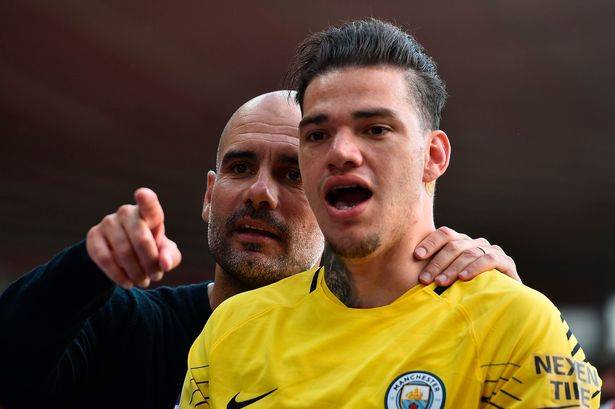
Guardiola’s pre-eminence as one of contemporary football’s svengalis respected by all his peers is ample testimony to his non-lineal, out of the proverbial box, approach in implementing new paradigms and strategies on the pitch to mold his players into a concerted whole as a united and well-coordinated strikeforce.
Constant tactical tweaks and innovations
Guardiola continually demands creativity from his players from multiple areas of the pitch, and one of the things that really marks him out is his implementing of tactical tweaks to suit the game of the opposition and keep the his players ever vigilant and flexible on their toes.
One of his most famous strategic innovations in the Premier League is his use of inverted full-backs, besides having also helped define the false nine, and deploying midfielders as centre-backs, which have all served to change the convention of how we view the number eight.
Guardiola’s thought processes about how to constantly change and innovate football never stop never stops, often coming back from extended breaks with freshly-conceived innovative gems. After the enforced break, who knows what new feature football will be exposed to when City return to action this month?
Mixing tactical diligence with creative freedom
Another outstanding feature of Guardiola’s compelling brand of football is fusing positional organisation with sudden creative freedom in the final third. He subscribes to the belief of allowing his forwards to improvise once they reach the penalty area, believing in the adaptive abilities and individual talents and skills of his players to think and act afresh in front of the goal.
Guardiola infinitely sees it as his job to propel the team into the final third, all the while sorting out the tactics to ensure they are always in position to innovatively create new opportunities whilst adhering to his masterplan, but he cedes responsibility to the forwards to find their own solutions within the main framework of the game plans he has masterfully strategised.
Guardiola’s high level of respect for his players’ individuality, coupled with his hands-on in-depth coaching, maintains a happy and well balanced environment for the likes of his dynamos like Raheem Sterling, Silva, and De Bruyne to flourish.
When the indefatigable Catalan arrived at Bayern Munich the players were totally baffled by his insistence that they do not go on long runs around the training field. Guardiola clings to his singular belief in the importance of training with the ball at all times.
His unique approach to building fitness and developing technical ability relies heavily upon rondos, an extrapolated form of piggy-in-the-middle that has become a defining feature of almost every top club in Europe since Guardiola popularised the idea.
Rondos improve players’ decision-making, first touch and passing, and coupled with the positional grid system they allow Guardiola’s players to play mini-rondos throughout real 90-minute matches.
Variety of formations and tactics coached at a time
Guardiola uses the summer to coach his players a wide variety of tactical styles and banking them during the off-season.
All three of top flight clubs he has served in have had seven or eight different formations in their locker, always ever ready to come out to be deployed whenever the situation calls for it.
With that level of variety at his disposal, Guardiola is able to prevent his teams from going stale while also preventing opponents from figuring out how to stop them. There are simply too many ways in which his teams can inflict damage on their rivals.
Video analysis with players to create the most formidable defences
Defenders who have worked with Guardiola often recall being shown hundreds of hours of video footage to improve their game, and this has indeed been an aspect of his tactics that is widely overlooked.
Guardiola has always ardently believed that an impenetrable defence forms the foundation, and everything else follows. He has an exceptional defensive record throughout his career, which comes primarily from the sheer detail of his video analysis and scouting.
The defence must always move as one, ever brave and bold in taking the risk of a high line, and that it must be ruthlessly drummed into them to be positionally indomitable.
Humility to adapt to different leagues
Another famous incident from Guardiola’s first few months at Bayern, as revealed in an anecdote from Marti Perarnau’s book Pep Confidential, was the time he chastised his players for trying to emulate playing like Barcelona.
He worked diligently and strove to make Bayern into a German team that reflected the country’s footballing culture, something he totally immersed himself in while living in Munich.
In like measure, Guardiola deliberately adapted his tactics to the culture of the English game, demanding that his players adhere to the physicality and speed of the Premier League, which explains why City counter-attack more than his other teams in the past, why Bayern were harder pressing, and why Barcelona were able to pass teams to with alarming consistency and success in a way City and Bayern did not.
It would take a book to dovetail the mind-boggling genius of this madcap coach-cum-manager extraordinaire who has personally coached and guided some of the football world’s most talented superstars, not least among whom is the incomparable 6-time Balon D’or winner, Lionel Messi.
This in itself speaks volumes about the extraordinary genius and uniqueness of Pep Guardiola.

